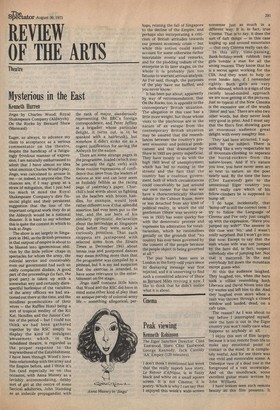REVIEW OF THE ARTS
Theatre
Mysterious in the East
Kenneth Hurren
Jingo by Charles Wood; Royal Shakespeare Company (Aldwych) On the Rocks by Bernard Shaw (Mermaid) Eager, as always, to advance my claim to acceptance as a serious commentator on the theatre, despite the handicap of a fatiguingly frivolous manner of expression, I am naturally embarrassed to admit that I have almost no idea what emotion Charles Wood's play, Jingo, was calculated to arouse in me — or, indeed, in anyone else. The chances are, if I may grasp at a straw of mitigation, that 1 just had too much in mind the Royal Shakespeare Company's dire financial plight and their persistent suggestion that the loss of the important original work they do at the Aldwych would be a national disaster. It is hard to say whether this is quite the context in which to look at Jingo.
The show is set largely in Singapore in 1941, as the British presence in that outpost of empire is about to be blasted into ignominious oblivion by the little yellow chaps in spectacles for whom the army, the colonial service and conceivably even our government had such an oddly complacent disdain. A good part of the proceedings (in fact, the good part) is taken up with a somewhat wry and certainly disrespectful burlesque of the vacuities of the army officers we had stationed out there at the time, and the mindless promiscuities of their wives — the Raffles Hotel being a sort of tropical medley of the Kit Kat, Skindles and the Junior Carlton of the period — but I could not think we had been gathered together by the RSC simply to display the kind of indulgent amusement which, in the subsidised theatre, is regarded as the proper response to the waywardness of the Establishment. I have been through Wood's lovehate relationship with the army and the Empire before, and I think it's fun (and especially so on this occasion, with Anna Massey as a lavishly accommodating, debby sort of girl at the centre of some farcical adulteries, John Standing as an imbecile propagandist with the rank of major, slanderously representing the BBC's foreign correspondence, and Peter Jeffrey as a brigadier whose particular delight, it turns out, is to be spanked with a hairbrush), but somehow it didn't strike me as a cogent justification for saving the Aldwych for the nation.
There are some strange pages in the programme, loaded (which may be precisely the right verb) with those routine expressions of confidence that issue from the leaders of nations at war and can later seem as foolishly fallible as the racing page of yesterday's paper. Churchill's bold words about us fighting on the beaches with broom handles, for example, would look rather different now if that splendid assertion had ever been put to the test, and the use here of his similarly optimistic declaration about the battleships at Singapore (just before they were sunk) is curiously pointless. That such snippets are juxtaposed with selected items from the Straits Times in December 1941 about tennis teas and postponed dances may mean nothing more than that the programme was compiled by a pinhead, but it is my sad suspicion that the exercise is intended to have some relevance to the entertainment on the stage.
Jingo itself contains little hints that Wood and the RSC did have in mind some other kind of play than an antique parody of colonial army life — something allegorical, per haps, relating the fall of Singapore to the decline of the Empire, and perhaps also incorporating a criticism of British attitudes towards our present economic crisis — but while this notion could easily account for some otherwise rather inscrutable events and remarks, and for the plodding tedium of the enterprise in its later stages, on the whole it is probably just too fatuous to warrant serious analysis. As I've said, though, the purposes of the play have me baffled, and you never know.
It has been put about, apparently by way of recommendation, that On the Rocks, too, is apposite to the contemporary British situation. The allegation in this case has a little more weight, but those whose visits to the playhouse are in the nature of an escape from the contemporary British situation may be assured that the resemblances between the country's present economic and political predicament and that dramatised by Shaw in 1933 are pretty superficial. They have mostly to do with the high 1933 level of unemployment which has led to rioting in the streets and the fact that the country has a coalition government, both of which circumstances could conceivably be just around our own corner. For the rest we have a characteristically Shavian debate in the Cabinet Room, more or less detached from any kind of political reality, in which the old gentleman (Shaw was seventy-seven in 1933) has some quirky fun with the democratic process and expresses his admiration for totalitarianism, which he rationalises genially on the grounds that "no country has ever been governed by the consent of the people because the people object to being governed at all."
The play hasn't been seen in London in the forty-odd years since its dismaying message was first rejected, and it is unnerving to find such a committed admirer of Shaw as Bernard Miles reviving it now. I like to think that he didn't notice what it is about.


































 Previous page
Previous page